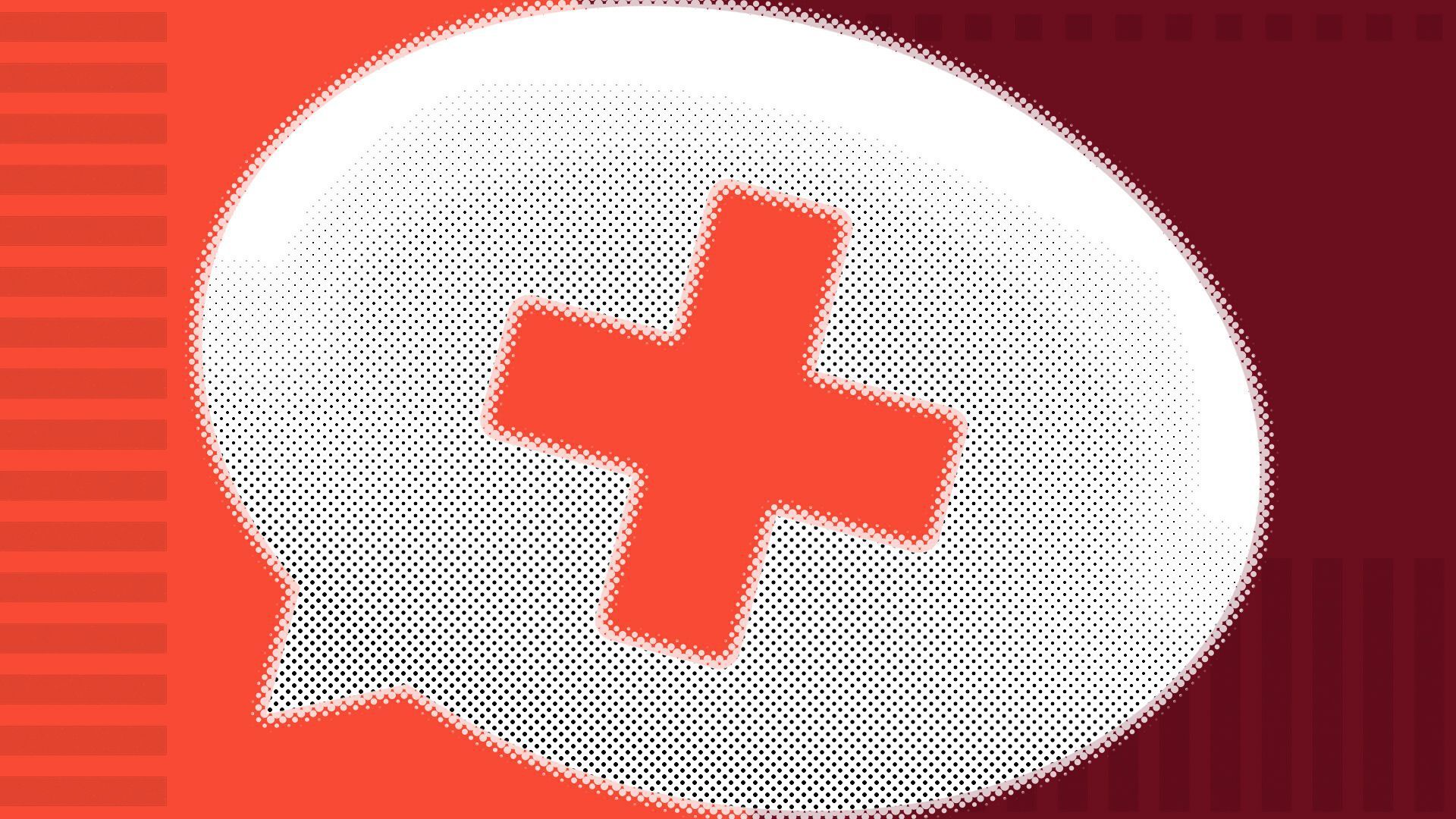| |
| |
| |
| Presented By UnitedHealthcare |
| |
| Axios Vitals |
| By Tina Reed · Oct 21, 2022 |
| 🍂 Happy Friday, Vitals readers. It officially feels like apple cider and doughnuts season, and that's what I'll be enjoying this weekend. How about you? Today's newsletter is 939 words or a 3.5-minute read. |
| |
| |
| 1 big thing: ACA is MIA from campaign fights ... |
 |
|
| Illustration: Aïda Amer/Axios |
| |
| The Affordable Care Act, a trigger point in political campaigns for more than a decade, has been conspicuously absent from debates and campaign rhetoric this year, Axios' Victoria Knight and Andrew Solender write. The big picture: After multiple failed attempts to scrap the health law in Congress and the courts, Republicans by and large accept that the ACA is here to stay and are reluctant to touch the tripwire again. - What's noteworthy is that Democrats aren't touting the law's affordable coverage in inflationary times, especially after they extended ACA subsidies for three years in the Inflation Reduction Act and prevented steep premium hikes for marketplace enrollees.
What they're saying: "This is really the first campaign in a decade where the ACA hasn't been a dominant issue. That may be because Democrats generally have better success when they're fighting against Republican plans than when they're advocating for their own efforts," Larry Levitt, executive vice president for health policy at the Kaiser Family Foundation, tells Axios. Flashback: Health care cost and coverage fights played defining roles in the past six election cycles, dating to when the GOP flipped control of the House in the 2010 midterms, spurred by backlash to the passage of the ACA. - Fast forward to 2020: President Biden campaigned on creating a public option and expanding the ACA. Former President Trump, meanwhile, promised to bring forward an alternative Republican health care plan that never materialized.
Yes, but: Recent Senate debates haven't featured much tangling on health coverage. Nor have political ads, per the Washington Post. |
    |
| |
| |
| 2. ... but there's plenty of talk about abortion |
 |
|
| Illustration: Brendan Lynch/Axios |
| |
| Democrats are intent on making abortion a defining issue of the midterm election cycle and painting Republican opponents of the procedure as extremists. But it's unclear whether that intense focus will keep them in control of the Senate, Axios' Oriana Gonzalez writes. State of play: Polls show that since the Supreme Court overturned Roe v. Wade, Americans are more motivated to vote for candidates that support abortion access. - But a New York Times/Siena College poll this week found a dramatic shift among women who identify as independents — a group the Democrats have been targeting but who cite the economy, not reproductive rights, as the biggest concern.
Driving the news: Abortion looms particularly large in Senate races in battleground states. If Republicans retake control of the chamber, they could bring up a nationwide 15-week ban on the procedure. Go deeper. |
    |
| |
| |
| 3. The next step in Biden's effort to lower drug prices |
 |
|
| Illustration: Sarah Grillo/Axios |
| |
| The next phase of the Biden administration's bid to curb rising drug costs is in the hands of an under-the-radar federal office called the Center for Medicare and Medicaid Innovation (CMMI), Axios' Maya Goldman writes. Driving the news: The center will publish a report within three months on how it can use new payment and delivery models to lower drug costs and boost access to treatments for beneficiaries of the two government health programs, per a recent executive order from Biden. Be smart: The expectation is CMMI will tackle the prices health providers pay for Medicare drugs like infusions or injectables. Under the Inflation Reduction Act, the government can't negotiate prices for these drugs until 2028. - Experimenting with price negotiation or payments based on patients' health outcomes could help regulators learn best practices before that start date.
- CMMI may also look for ways to incorporate drug pricing reforms into its existing projects and across different federal payers, said David Ault, a lawyer at Ropes & Gray and a former innovation center employee.
Yes, but: The center has tried to tackle drug prices under previous administrations, with mixed success. Read the rest. |
    |
| |
| |
| A message from UnitedHealthcare |
| HouseCalls help prevent health issues among seniors |
| |
 |
| |
| UnitedHealthcare's Medicare Advantage HouseCalls provide preventive care visits in the comfort of seniors' own homes. The highly trained nurses are thorough, spending up to an hour with seniors and following up with doctors to address any issues. Learn more. |
| |
| |
| 4. Tweet du jour: Throwing shade |
 |
|
| Twitter. @larry_levitt |
| |
| Advisers to the Centers for Disease Control and Prevention yesterday unanimously voted to add COVID-19 vaccines to the 2023 schedule of childhood and adult immunizations, Axios' Sabrina Moreno and Arielle Dreher write. - GOP personalities took to social media and the airwaves, saying the move was tantamount to a mandate that kids get COVID shots. Kaiser Family Foundation's Larry Levitt weighed in with a reminder the CDC has no such regulatory muscle, whether it applies to childhood vaccines or wrapping leftover pot roast.
|
    |
| |
| |
| 5. Surgeon general takes on quiet quitting |
 |
|
| Surgeon General Vivek Murthy. Photo: Jordan Vonderhaar/Bloomberg via Getty Images |
| |
| If you haven't heard enough about worker burnout and the buzzy trend of quiet quitting, Surgeon General Vivek Murthy wants a moment of your time. Driving the news: Murthy released a 30-page framework yesterday taking aim at America's toxic workplaces. - Among other things, the report says, employers need to prioritize work-life balance, equity, flexibility, enough time to sleep and the ability to seek mental health support.
- Fixing our miserable jobs isn't just important for the economy — which is still reeling from the "great resignation" — it's critical for our collective health, he said.
What he's saying: "The COVID-19 pandemic has changed the nature of work and the relationship many workers have with their jobs. The link between our work and our health has become even more evident," Murthy said. |
    |
| |
| |
| 6. Dog of the week |
 |
|
| Nancy Peanutbutter. Photo: Jilli Sparks |
| |
| Meet Nancy Peanutbutter, a 3-year-old rescue lab-hound mix who is being featured today as much for that fantastic name as for her adorable face. - Nancy lives in D.C. with her human Jilli Sparks, from the Industry Guidance Branch Office of Counsel to the Inspector General at HHS.
- "She loves road trips, dressing up for Halloween, and stealing food any chance she can get, and her best friend is a Chihuahua named Jay Gatsby," Sparks writes.
We're getting close to Halloween, folks. Send me the best shots of your pup in costume, and I may feature them in an upcoming newsletter! |
    |
| |
| |
| A message from UnitedHealthcare |
| Better care with UnitedHealthcare's Medicare Advantage HouseCalls |
| |
 |
| |
| Millions of Medicare Advantage seniors rely on UnitedHealthcare's free HouseCalls program, which brings important preventive care visits into their homes. Our HouseCalls program helps keep seniors out of the hospital, and members give the service a 99% satisfaction rating. Find out more. |
| |
| Thanks for reading, and thanks to senior editor Adriel Bettelheim and copy editor Carolyn DiPaolo for the edits. Please ask your friends and colleagues to sign up. |
 | | Why stop here? Let's go Pro. | | |











No comments:
Post a Comment